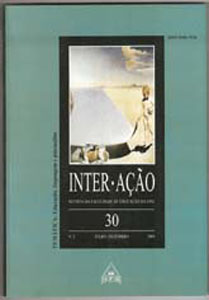O LUGAR DO OUTRO NAS TEORIAS SOBRE A AQUISIÇÃO DA LINGUAGEM
DOI:
https://doi.org/10.5216/ia.v30i2.1311Abstract
De modo geral, as teorias de aquisição da linguagem concordam que a criança só passa a ser falante por estar exposta às falas de um outro. Contudo, não é certo que esse outro tenha para as diversas teorias um valor heurístico. Refletir sobre o lugar do outro nas teorias sobre aquisição da linguagem é o caminho deste artigo, e a linha teórica privilegiada é aquela que considera a aquisição da linguagem como um processo de subjetivação. Tributária do encontro dos trabalhos lingüísticos de Cláudia de Lemos com a psicanálise, essa abordagem permite escutar o sujeito nas vias de ser um falante, como os casos de Victor do Aveyron (um clássico) e Mari (hodiernamente) trazidos no final deste artigo. Esses casos enigmáticos interrogam insistentemente as teorias de aquisição da linguagem.Downloads
Downloads
Published
How to Cite
Issue
Section
License
Inter-Ação uses the Creative Commons Attribution 4.0 License for Open Access Journals (Open Archives Initiative - OAI) as the basis for the transfer of rights. Open access means making documents available on the Internet free of charge, so that users can read, download, copy, distribute, print, search, or link to the full text of documents, process them for indexing, use them as input data for software programs, or use them for any other lawful purpose, without financial, legal, or technical barriers.
Authors publishing in this journal agree to the following conditions:
1) Authors retain copyright and grant the journal the right of first publication, with the work simultaneously licensed under the Creative Commons Attribution License, which permits redistribution of the work with attribution and first publication in this journal.
2) Authors are permitted to enter into additional, separate agreements for non-exclusive distribution of the version of the work published in this journal (e.g., for publication in an institutional repository or as a book chapter), with attribution and first publication in this journal.
3) Authors are permitted and encouraged to publish and distribute their work online (e.g. in institutional repositories or on their home page) at any time before or during the editorial process, as this may generate productive changes as well as increase the impact and citation of the published work.















